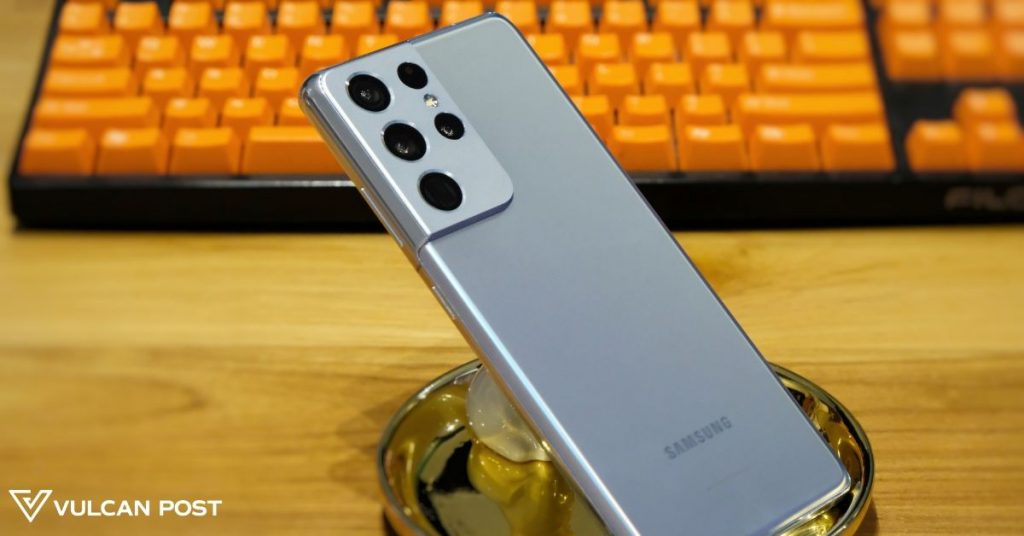The Samsung Galaxy S21 Ultra has gotten many Samsung fans excited no doubt, and from our first impressions, we can see why.
First off, when you take it out of the box, it certainly looks different from its predecessor. From the back, that is. The S20 Ultra had more of a glossy finish, while the S21 Ultra opted for a matte metallic finish instead.
This already gives the phone a more premium look right off the bat, especially with how the Phantom Silver (which we received) can take on pink hues in certain lighting.

If you bring your eyes to its quad-camera setup, you’d notice that something looks a little different too. The camera bump (which some dislike and others just don’t care about) is still very much present, adding another 2mm to its overall thickness, but Samsung has attempted to make its design a bit more seamless.

They’ve done this by integrating the camera’s edge with the phone’s, rather than have it stand out in a rectangular box on its own, protruding out from the back. It doesn’t really affect the way it feels in the hand though.
Hefty For That Premium Feel
Looks aside, the phone itself carries some weight physically (we’ll head to the internal specs shortly). Upon weighing it ourselves and checking with other sources, we can come to the consensus that it weighs between 228-229g.

In comparison, the S21 weighs just 171g, while the S20 Ultra weighs 220g.
Holding it for a while isn’t too bad, but if you’re using it for extended bouts of entertainment and news, you’re probably going to feel some strain after a while.
The large cameras also make it so that the weight is skewed slightly to the top right of the phone, which could unbalance your grip if you’re not careful.

However, all this weight does add to the premium feel of the phone, since it doesn’t come off as light and “plasticky”.
A Snapshot Of Its Cameras
We only had the S20 and Note20 as our other Samsung comparison phones on hand, so the S21 Ultra’s selfie camera felt like a huge upgrade.

The difference between its 40MP camera versus the S20 and Note20’s 10MP selfie camera was so obvious, with the pictures being clearer and overall better quality. If you’re coming from the S20 Ultra though, they share the exact same specs, so you may be less impressed.
Rather than attempt to impress with extremes like on the S20 Ultra, Samsung also opted to tone it down and refine the experience more. In line with that, they opted for a 108MP wide, 12MP ultra-wide, and two 10MP telephoto lenses, one with a 3x zoom and the other with 10x zoom.
The 100x Space Zoom is still present, but Samsung promises that it’s much better this time round thanks to a new laser autofocus system. We can see that it works to help stabilise your subject, but don’t expect crisp pictures, which still begs the question of, why would we ever need this feature?
A Display That Knows What You’re Doing
Samsung introduced a new adaptive display (10-120Hz on the S21 Ultra) so that users no longer have to pick between having a high resolution or high refresh rate display.
You can now have the best of both worlds, as the displays will automatically adjust to whatever you’re doing. For example, if you’re simply reading an article online, its refresh rate will drop. Turn on a game, and it’ll pick back up.
This is meant to help save some battery life, though with the 5,000mAh battery that the S21 Ultra is packing, we don’t see quick battery drainage being that big an issue.
It could be thanks to this new adaptive display that we noticed how good the screen quality looked. At 6.8”, its Quad HD+ Dynamic AMOLED 2X display is impressive.
-//-
The S21 Ultra is also Samsung’s first S series phone to work with an S Pen. We didn’t have its own S Pen to test, but we tried it with the Note20’s S Pen and it worked fine. It was smooth and responsive, making note-taking a breeze.

We can’t confirm if the S21 Ultra’s S Pen has the same 9ms latency that the Note20 Ultra’s S Pen did, but it would make sense that it should.
The only thing worth lamenting over is that the S21 Ultra doesn’t come with an S Pen itself, nor can it be stored within the phone’s body like the Note20 and Note20 Ultra’s. Instead, you’d have to make an add-on purchase of a bulky case to get the S Pen.
But hey, maybe that’s more incentive to protect the pretty back and prominent cameras of the S21 Ultra.
We’ll be spending more time with the S21 Ultra to write up a more detailed review soon, so stay tuned for that!
- You can pre-order the Samsung Galaxy S21 Ultra for RM5,299 here.
- You can read more of what we’ve written on Samsung here.














